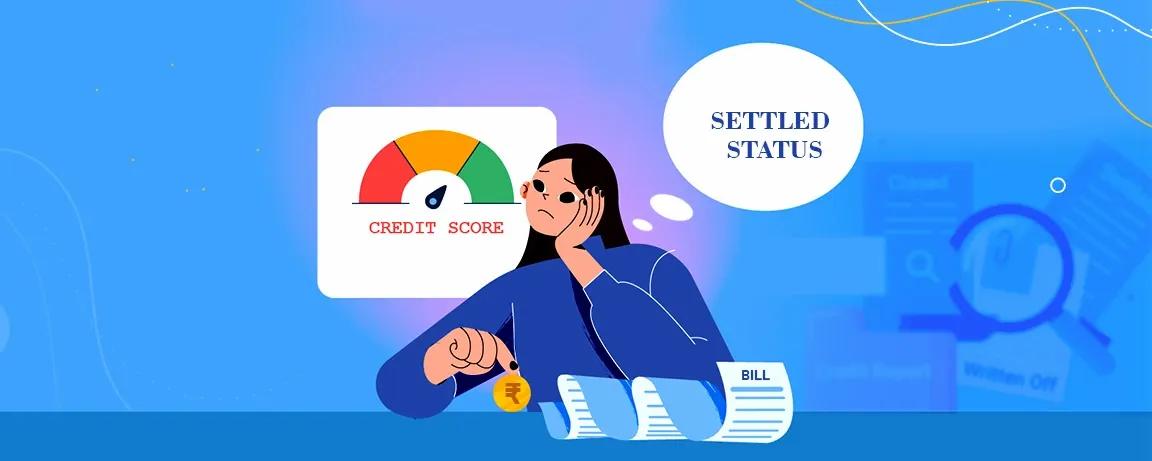What are the Effects of Settled Status on CIBIL Score?
Getting a loan “settled” by your bank is a matter of relief, right? Wrong.
Why, you would ask. After all, if you are unable to continue paying your EMIs due to an emergency, isn’t it great that your lender is allowing you to make a one-time settlement and write-off the remaining loan amount?
No – and there are two main reasons why it is so.
1) There are long-term repercussions to a “settled” status reflecting in your CIBIL Report under account information.
2) There are ways other than loan settlement that can help you manage your repayment in case an urgent situation crops up and leaves you high and dry.
But first, let’s understand what loan settlement means.
CIBIL Report: Settled Status Vs. Closed Status
A loan is regarded as closed when it has been repaid in full, with all the interest. Once you complete all your EMI payments, your bank will issue you a loan closure certificate or loan completion certificate. This will, then, reflect in your CIBIL report as ‘closed’ – showing you as a responsible borrower.
In contrast, a settlement happens when a bank realizes that a loan will incur them loss – that the borrower is simply unable to repay them the entire amount borrowed (along with the interest amount).
As EMI payments get missed, the bank will first send the borrower reminders for six months. After due investigation, once the bank is certain that full loan repayment would never happen, they would offer one-time settlement. They are simply trying to get whatever they can from a defaulting customer. The unpaid amount, then, gets entered into the bank’s loss record.
While the uninformed borrower may say ‘good riddance’, that’s hardly the case.

How does ‘Settled Status’ impact your CIBIL Score?
Your credit / CIBIL score is the key to any future loans that you can avail of. Most lenders will not consider a borrower’s loan application if the CIBIL score is below 750 or 700.
The settled status in your CIBIL report knocks off as many as 75 to 100 points from your credit score. What’s worse, you can’t get rid of this negative credit behaviour marker anytime soon. The loss in credit score will reflect for seven years. It will be impossible for you to get a loan at affordable interest rates during this period.
The CIBIL score ranges from 300 to 900. A credit responsible individual will have a score of 750 or above. Now imagine – if for some reason this person is compelled to ‘settle’ his/her loan, the credit score will drop to 650, i.e., below the limit accepted by most banks.
If this person does succeed is getting his loan application approved, he would never be able to secure it at an attractive interest rate. Viewing him as a risky borrower, most banks will not extend him any loans – and those that do will only do so at high rates of interest.
Why settle a loan when there are other solutions?
There could be many reasons why an honest borrower suddenly finds himself in a position where he can’t continue paying his EMIs – a medical emergency, natural calamity, debilitating accident, and loss of employment being some of the reasons.
However, the key reasons why such borrowers may agree to get their loans settled are basically two:
1. Lack of awareness: The customer has no idea that his credit worthiness will be dented for years.
2. Poor research into long-term impact of a settlement offer by the bank: Relieved by the one-time settlement offer, the customer doesn’t make an effort to find out how this would impact him in the long run.
**You can check Credit Score online for Free by PAN number on our MyMoneyMantra website.
Actually, if the borrower looks around for solutions, there could be several other ways out of this situation. Let’s take a look at some of these:
1. Take a family loan to repay the bank
Explore and find out if a friend or family member can help you shoulder the burden of your EMIs while you ride out the sticky situation you find yourself in (such as a job loss). Once you’re back on your feet, you can repay the friend or relative who helped you out. In the meantime, your EMI payments will keep going as usual.
2. Talk to your bank about alternate solutions
Discuss with your bank and find out if they will entertain alternate solutions such as waiving off the interest for a specified duration, or if they would agree to increase your loan repayment tenure – thus reducing your EMI. Many lenders will be ready to consider these options in the face of a loan settlement and permanently writing off the unpaid amount.
There are preventive steps, too, which you can take to avoid getting into a corner in the first place.
1. Have an exigency plan while taking a loan
Think of a back-up in case mid-way through your loan repayment you find yourself unable to go on. This back-up could be a plot you purchased for future investment, jewellery, or a part of your savings.
2. Take an insurance on your loan, if you wish to be super careful
All kinds of insurance, at the end of the day, are meant to support us when we’re faced with unthinkable life situations. This is the same. While taking a loan, especially if it’s a big amount (e.g., a home loan), you may want to opt for an insurance so that your EMI payments remain uninterrupted through the ups and downs of life.
Ultimately, whatever steps you take, do understand that opting for a loan settlement should always be your last option. A lot depends on your credit worthiness, so, don’t take it lightly.
Also Read: Four Easy Ways to Get Your Credit Score Back on Track

